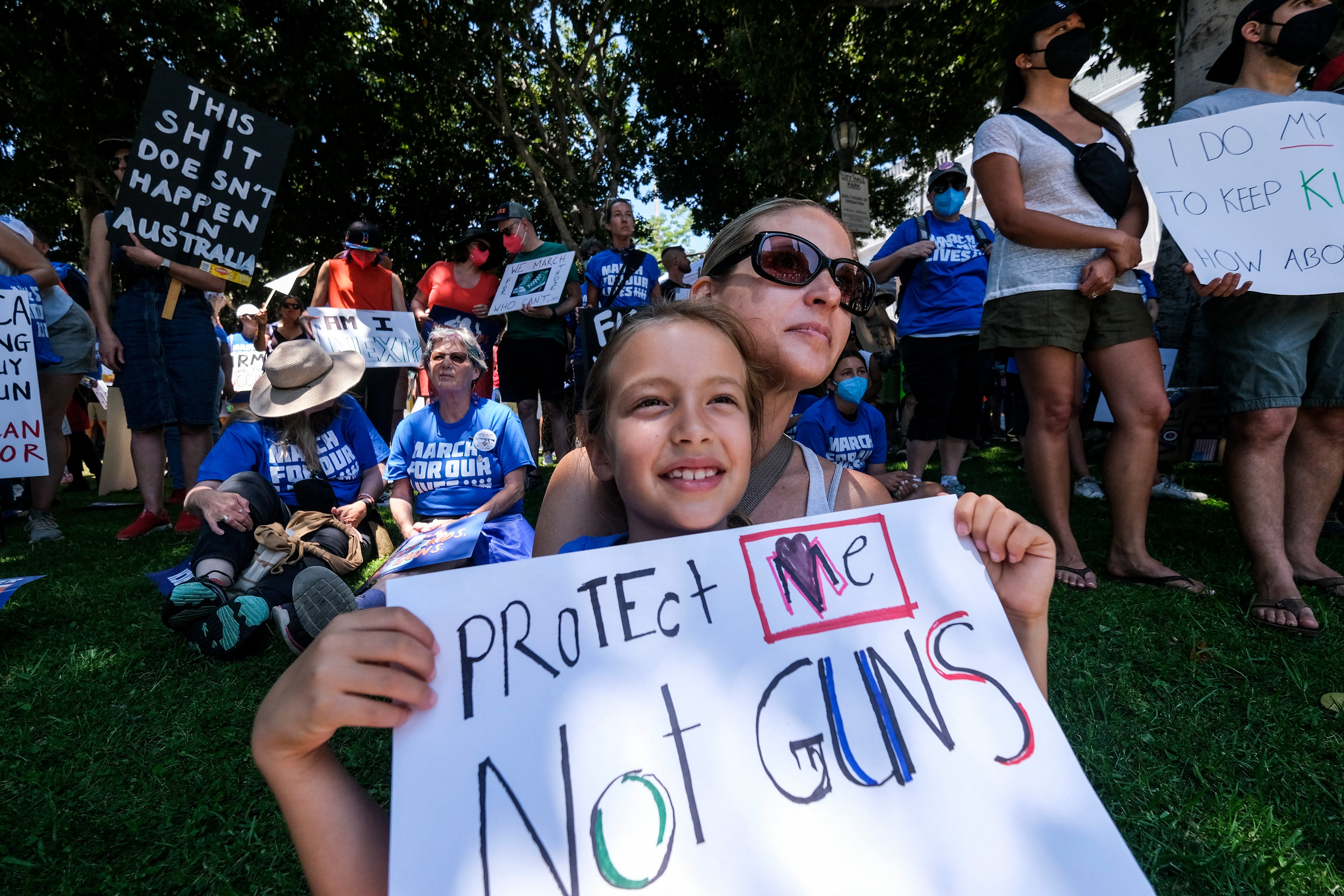Diversity of opinion across the US is wider than you think
It’s easy to think that all of America is the same, but in every red state there are blue dots, and in every blue there are red, writes Holly Baxter


Whenever a big tragedy befalls the US, people on the outside – usually people I know in Britain – are quick to announce that they brought it on themselves. They got attached to the Second Amendment, they voted in people who believe in QAnon, they blindly followed Donald Trump. Hundreds of years ago, they left Europe in search of a more puritanical future, and now they have it. What did they expect except this, a nation of death by gun and no abortions?
The idea that Americans don’t have the right to expect basic safety from mass shooters or honest representatives is one that drives me a little mad. Yes, there are southern towns full of people who fly Confederate flags and affix bumper stickers declaring themselves “AGAINST THE DEEP STATE” on their pick-up trucks. Yes, there are people who willingly sign up to the NRA and teach their 10-year-olds how to shoot rifles in the backyard before launching into a rendition of country star Toby Keith’s most controversial, pro-war anthem “Courtesy of the Red, White and Blue”. Yes, there are divisive Americans and naive Americans and evangelical Americans and Americans who vote against their best interests despite being female or black or gay or Latino or disabled or all of the above. And yes, there’s a little bit of schadenfreude in it for Europeans, who grew up watching American politicians declare themselves “the policemen of the world” and hearing about how the US thinks it’s “the best nation on the planet”, and are now watching the empire crumble spectacularly. It’s no secret the US will soon be less financially and militarily powerful than China. Their glory days are over, their birth rate is low, and if they keep trying to lock potential immigrants out at the border, they’ll have a jobs crisis on their hands within a couple of decades.
All of this is true, yet it forgets the nuance. On the ground in the US, I’ve been struck by how many people I’ve met who are stuck in a political reality they didn’t choose because of gerrymandering and disenfranchisement. There was the elderly woman who sat outside an abortion clinic in Alabama in the boiling hot sun every day, holding a sign that said she supported women’s rights, and compassionately helping out any young person who came along. There was the middle-aged libertarian in Dallas who told me he didn’t agree with much of what Trump stands for – and certainly not with any of the religious stuff – but he has to hitch his wagon to the Republicans because otherwise there’s no party for him. There were the thousands of Pride and BLM flag-flying residents of Austin who love their city but have no representation in Congress. And there were the 19-year-olds from Oklahoma and Missouri who I met outside the Supreme Court in Washington DC last weekend, both states with trigger law bills that have effectively outlawed abortion, who don’t know what to do next. They don’t want to be forced out of their home states and away from their families, but their rights have just been signed away.
It’s important to remember the blue dots in the red states – and vice versa – because the US is a much more diverse country, involving a broader spectrum of opinion, than most people think it is. Also in DC, I met a blue-haired person who identified as non-binary, Democratic-voting, vegan and anti-abortion. I spoke with them for a long time, and they told me that they’d decided they were pro-life after thinking about the life cycle of cats and the fact that they don’t eat eggs because they’re baby chicks “so why would I support the same in humans?” The rise in this kind of thinking is mystifying to me, especially considering this person came from San Francisco in California, one of the bluest states you can get. But it’s undeniable that it’s becoming more and more of a popular opinion. In 2019, I met a group of students in Alabama who identified as “pro-life in the sense of pro-immigrant, anti-death penalty, and pro-baby”. They will have undoubtedly celebrated the overturning of Roe v Wade as well.
Looking into what’s happening within the liberal and conservative enclaves – the changes, the shades of grey and the unexpected opinions – is often more instructive than zooming out and looking at America as a whole. And it’s worth bearing in mind that most people in the US hope to live their lives unimpeded and quietly. They are not the people you see standing in front of American flags and railing about communism. The ways in which those people convince them to get on board, however, are often fascinating — and, as religious leaders often say, the dedication of the convert is usually unmatched. My blue-haired, non-binary interviewee from San Francisco told me they were on vacation in Florida when the overturning of Roe v Wade was announced. “I got the first plane out,” they said. “I just wanted to come here to meet my online friends and celebrate.” That’s something I won’t forget in a hurry.
Join our commenting forum
Join thought-provoking conversations, follow other Independent readers and see their replies
Comments
Bookmark popover
Removed from bookmarks